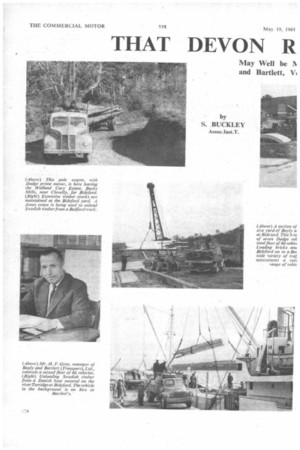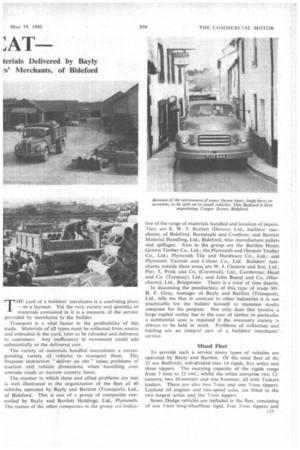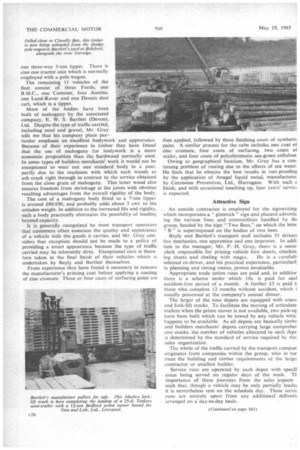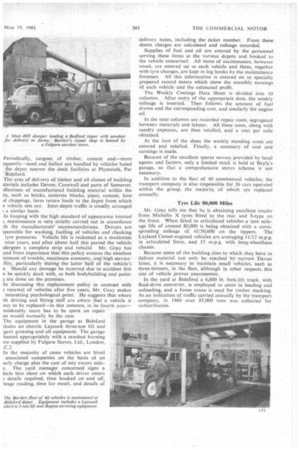THAT DEVON R
Page 62

Page 63

Page 64

Page 69

If you've noticed an error in this article please click here to report it so we can fix it.
:AT THE yard of a builders' merchants is a confusing place —to a layman. Yet the very variety and quantity of materials contained in it is a measure of the service
provided by merchants to the builder, .
Transport is a vital factor in the profitability of this trade, Materials of all types must be collected from source and unloaded in the yard, later to be reloaded and delivered to customers. Any inefficiency in movement could add substantially to the delivered cost.
The variety of materials handled necessitates a corresponding variety of vehicles to transport them. The frequent instruction "deliver on site" raises problems of traction and vehicle dimensions when travelling over unmade roads or narrow country lanes. .
The manner in which these and allied problems are met is well 'illustrated in the organization of the fleet of 40 vehicles operated by Bayly and Bartlett (Transport), Ltd., of Bideford. This is one of a group of companies controlled by Bayly and Bartlett Holdings, Ltd., Plymouth. The names of the other companies in the group are indica tive of the range of materials handled and location of depots. They are E. W. S. Bartlett (Devon), Ltd., builders' merchants, of Bideford, Barnstaple and Crediton; and Bartlett Material Handling, Ltd., Bideford, who manufacture pallets and spillages. . Also in the group are the Bartlett Home ..Grown Timber Co., Ltd.; the Plymouth and Orestan Timber Co., Ltd.; Plymouth Tile and Hardware Co., Ltd.; and Plymouth Varnish and Colour Co., Ltd, Builders' merchants outside these areas are W. J. Clemow and Son, Ltd., Par; T. Prisk and Co. (Cornwall), Ltd., Camborne; Head and Co. (Torquay), Ltd.; and John Board and Co. (Merchants), Ltd., Bridgwater. There is a total of nine depots.
In discussing the peculiarities of this type of trade Mr. H. F. Gray, manager of Bayly and Bartlett (Transport), Ltd., tells me that in contrast to other industries it is not practicable for the builder himself to maintain stocks adequate for his purpose. Not only does this involve a large capital outlay but in the case of timber in particular a substantial area is required if the necessary variety is always to be held in stock. Problems of collection and loading are an integral part of a builders' merchants'• service.
Mixed Fleet To provide such a service many types of vehicles are operated by Bayly and Bartlett. Of the total fleet of 40, 22 are Bedfords. sub-divided into 14 rigids, five artics and three tippers. The carrying capacity of the rigids range from 7 tons to 25 cwt.; whilst the artics comprise two 12tonners, two 10-tanners and one 8-tonner, all with Taskers trailers. There are also two 7-ton and one 5-ton tippers. Leyland oil engines and two-speed axles are fitted to the two largest artics and the 7-ton tippers.
Seven Dodge vehicles are included in the fleet, consisting of one 5-ton long-wheelbase rigid, four 5-ton tippers and c25 one three-way 3-ton tipper. There is also one tractor unit which is normally employed with a pole wagon.
The remaining 11 vehicles of the fleet consist of three Fords, one B.M.C., one Commer, four Austins, one Land-Rover and one Dennis dust cart, which is a tipper.
Most of the bodies have been built of mahogany by the associated company, E. W. S. Bartlett (Devon), Ltd. Despite the type of traffic carried, including sand and gravel, Mr. Gray tells me that his company place par ticular emphasis on excellent bodywork and appearance.
Because of their experience in timber they have found that the use of mahogany for bodywork is a more economic proposition than the hardwood normally used. In some types of builders merchants' work it would not be exceptional to wear out one standard body in a year, partly due to the readiness with which such woods as ash crack right through in contrast to the service obtained from the close grain of mahogany. This latter wood also ensures freedom from shrinkage at the joints with obvious resulting advantages from the overall rigidity of the body.
The cost of a mahogany body fitted to a 7-ton tipper is around £80/£90, and probably adds about 5 cwt. to the unladen weight. In addition to the increased life and rigidity, such a body practically eliminates the possibility of loading beyond capacity.
It is generally recognized by most transport operators that customers often associate the quality and appearance of a vehicle with the goods it carries, and Mr. Gray considers that exception should not be made to a policy of providing a smart appearance because the type of traffic carried may be inherently dirty. Exceptional care is therefore taken in the final finish of their vehicles which is undertaken by Bayly and Bartlett themselves.
From experience they have found it necessary to remove the manufacturer's priming coat before applying a coating of zinc cromate. Three or four coats of surfacing paint are then applied, followed by three finishing coats of synthetic paint. A similar process for the cabs includes one coat of zinc cromate, four coats of surfacing, two coats of scaler, and four coats of polychromatic sea-green cellulose Owing to geographical location, Mr. Gray has a continuing problem of rusting due to the effects of sea water. He finds that he obtains the best results in rust-proofing by the application of Anagal liquid metal, manufacture( by Corrosion Prevention, Ltd., Harrogate. With such a finish, and with occasional touching up, four years' senile( is expected.
Attractive Sign
An outside contractor is employed for the signwriting which incorporates a "gimmick "sign and placard advertis ing the various lines and commodities handled by thc group, headed by the sign "Two Bees," on which the lette " B" is superimposed on the bodies of two bees.
Bayly and Bartlett's transport staff includes 55 drivers five mechanics, one apprentice and one improver. In addi tion to the manager, Mr. F. H. Gray, there is a senio: clerk responsible for pricing vehicle hire sheets, checkin; log sheets and dealing with wages. He is a careful!! selected ex-driver, and his practical experience, particular!! in planning and timing routes, proves invaluable.
Appropriate trade union rates are paid and, in additior there is a scheme under which 10s. is paid for eacl accident-free period of a month. A further £5 is paid ti those who complete 12 months without accident, which i usually presented at the company's annual dinner.
The larger of the nine depots are equipped with crane and fork-lift trucks. To facilitate the moving of articulatetrailers when the prime mover is not available, two pick-up have been built which can be towed by any vehicle whic happens to be available. As all depots are basically timbe and builders merchants depots carrying large compreher sive stocks, the number of vehicles allocated to each depc is determined by the standard of service required by thei sales organization.
The whole of the traffic carried by the transport compan originates from companies within the group, who in tur meet the building and timber requirements of the largc! contractor or smallest builder.
Service runs are operated by each depot with specifi areas being served on regular days of the week. Tli importance of these journeys from the sales aspects such that, though a vehicle may be only partially loade( it is nevertheless sent on the schedule day. These servic runs are entirely apart from any additional deliveri< arranged on i day-to-day basis.
Periodically, cargoes of timber, cement and—more equently—sand and ballast are handled by vehicles based the depot nearest the dock facilities at Plymouth, Par Bideford.
The area of delivery of timber and all classes of building aterials includes Devon, Cornwall and parts of Somerset. allections of manufactured building material within the ea, such as bricks, concrete blocks, pipes, cement, lime tcl chippings, form return loads to the depot from which e vehicle sets out. Inter-depot traffic is usually arranged a similar basis.
In keeping with the high standard of appearance insisted a, maintenance is very strictly carried out in accordance th the manufacturers' recommendations. Drivers are sponsible for washing, fuelling of vehicles and checking tyre pressures. Vehicle life is reckoned as a maximum nine years, and after about half this period the vehicle idergoes a complete strip and rebuild. Mr. Gray has und from experience that this policy ensures the absolute inimum of trouble, maximum economy, arisi high serviceility, particularly during the latter half of the vehicle's
e. Should any damage be incurred due to accident this n be quickly dealt with, as both bodybuilding and paint
; are done on the premises.
In discussing this replacement policy in contrast With e renewal of vehicles after five years, Mr. Gray makes
interesting psychological point. He suggests that where ■ th driving and fitting staff are aware that a vehicle is out to be replaced—in this instance, in its fourth year nsiderably more has to be spent on repair an would normally be the case.
The equipment in the garage at Bideford *ides an electric Laycock three-ton lift and Tent greasing and oil equipment. The garage heated appropriately with a sawdust burning we supplied by Fulgara Stoves, Ltd., London, .C.2.
In the majority of cases vehicles are hired
associated companies on the basis of an ,urly charge plus the cost of any excess milee. The yard manager concerned signs a
hide hire sheet on which each driver enters details required, time booked on and off, leage reading, time for meals, and details of delivery notes, including the licket number. From these sheets charges are calculated and mileage recorded.
Supplies of fuel and oil are entered by the personnel serving these items at the various depots and booked to the vehicle concerned. All items of maintenance, however small, are entered up to each vehicle and these, together with tyre changes, are kept in log books by the maintenance foreman. All this information is entered on to specially prepared record sheets which show the monthly earnings of each vehicle and the estimated profit.
The Weekly Castings Data Sheet is divided into 10 columns. After entry of the appropriate date, the weekly mileage is inserted. Then follows the amount of fuel drawn and the corresponding cost, and similarly for engine oil.
In the next columns are recorded repair costs, segregated between materials and labour. All these costs, along with sundry expenses, are then totalled, and a cost per mile obtained.
At the foot of the sheet the weekly standing costs are entered and totalled. Finally, a summary of cost and earnings is made.
Because of the excellent spares service provided by local agents and factors, only a limited stock is held at Bayly's garage, so that a comprehensive stores scheme is not necessary.
In addition to the fleet of 40 commercial vehicles, the transport company is also responsible for 36 cars operated within the grout), the majority of which are replaced annually.
Tyre Life 80,000 Miles Mr. Gray tells me that he is obtaining excellent results from Michelin X tyres fitted to the rear and S-type on the front. When fitted to articulated vehicles a tyre mileage life of around 80,000 is being obtained with a corresponding mileage of 45/50,000 on the tippers. The Leyland Comet-engined vehicles are averaging 11/12 m.p.g. in articulated form, and 15 m.p.g. with long-wheelbase chassis.
Because some of the building sites to which they have to deliver material can only be reached by-narrow Devon lanes, it is necessary to maintain small vehicles, such as three-tonners, in the fleet, although in other respects this size of vehicle proves uneconomic.
In the yard at Bideford a 6,000 lb. fork-lift truck, with fluid-drive converter, is employed to assist in loading and unloading, and a Jones crane is used for timber stacking. As an indication of traffic carried annually by the transport company, in 1960 over 85,000 tons was collected for redistribution.




























































































































